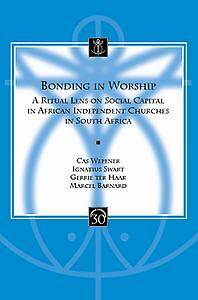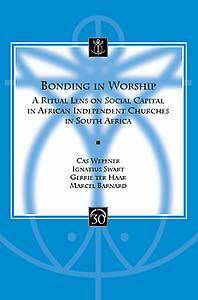
Je cadeautjes zeker op tijd in huis hebben voor de feestdagen? Kom langs in onze winkels en vind het perfecte geschenk!
- Afhalen na 1 uur in een winkel met voorraad
- Gratis thuislevering in België vanaf € 30
- Ruim aanbod met 7 miljoen producten
Je cadeautjes zeker op tijd in huis hebben voor de feestdagen? Kom langs in onze winkels en vind het perfecte geschenk!
- Afhalen na 1 uur in een winkel met voorraad
- Gratis thuislevering in België vanaf € 30
- Ruim aanbod met 7 miljoen producten
Zoeken
Bonding in Worship
A Ritual Lens on Social Capital in African Independent Churches in South Africa
€ 128,95
+ 257 punten
Omschrijving
In Sub-Saharan Africa Christianity is experiencing unprecedented growth and many people worship on a regular basis. Simultaneously, many parts of Sub-Saharan Africa experience challenges such as poverty and inequality. Given this reality and these challenges, a group of international scholars investigated the ritual practices of one of the fastest growing traditions, namely African Independent Churches, over a period of more than four years. The research team set out to explore the role of religious rituals in social capital formation and social development at community level in an African Independent Church in South Africa. This book is the final, comprehensive and synthesising product in which the international and interdisciplinary team of scholars from theology, religion and development present their findings. The book is structured into three parts that reflects its theoretical, empirical and evaluative dimensions. In part I, theoretical perspectives are offered on the main conceptual apparatus of the book and the authors' own understanding of the nexus between the different concepts. In part II, the theoretical arguments of the book are further worked out by means of eight explorations comprising of qualitative field work research in the religious milieus of African Independent worshippers in KwaZulu-Natal and the Eastern Cape, South Africa. In part III, a final set of chapters, by reflecting on the case studies in part II, offer wider appreciations and applications of the role religious ritual in social capital formation. This includes reflections on the African notion of ubuntu and the challenges that the ritual lens offer to policy makers in South African society, but also African society and the global South more generally speaking when seeking answers to the problem of development.
Specificaties
Betrokkenen
- Uitgeverij:
Inhoud
- Aantal bladzijden:
- 339
- Taal:
- Engels
- Reeks:
- Reeksnummer:
- nr. 30
Eigenschappen
- Productcode (EAN):
- 9789042938335
- Verschijningsdatum:
- 10/07/2019
- Uitvoering:
- Paperback
- Formaat:
- Trade paperback (VS)
- Afmetingen:
- 152 mm x 226 mm
- Gewicht:
- 521 g

Alleen bij Standaard Boekhandel
+ 257 punten op je klantenkaart van Standaard Boekhandel
Beoordelingen
We publiceren alleen reviews die voldoen aan de voorwaarden voor reviews. Bekijk onze voorwaarden voor reviews.








